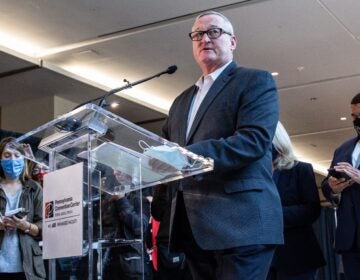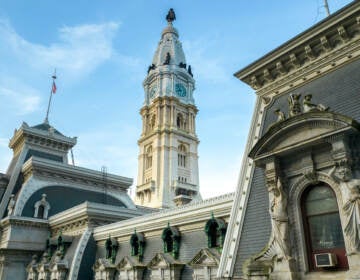Mayor Jim Kenney Part II: What’s next for Philly under his watch?
Gun violence, poverty, police turmoil — and maybe a recession. Philly’s next four years hold plenty of challenges.

Philadelphia Mayor Jim Kenney was elected to another term Tuesday. He joined supporters at IATSE Local 8 in South Philadelphia. (Kimberly Paynter/WHYY)
Rising homicides, a staggering poverty rate, a looming recession, crumbling public school buildings, a police department under fire — Philadelphia has a million problems, and Mayor Jim Kenney has four more years to leave his mark.
The city’s top official swept to an easy re-election on Nov. 5, securing his second term through 2023. Two hours after the polls closed, Kenney held an insurmountable lead over his opponent, according to unofficial election returns.
“Serving as your mayor has been the greatest honor of my life,” Kenney told a crowd of supporters in his victory speech.
The outcome is hardly a shock in a town where Democrats outnumber Republicans 7-to-1, leaving primary elections as the real battlegrounds. No incumbent mayor has lost a bid for their second term since the city’s charter was updated in 1954. Still, Republican nominee Billy Ciancaglini ran on a staunch anti-Kenney platform: repeal the soda tax, stop the supervised injection site, and end the city’s “sanctuary” policy.
Those policies aren’t embraced by everyone — but few detractors opened their wallets to aid Kenney’s challenger.
Ciancaglini raised less than $12,000 throughout his campaign. Kenney, after surviving a three-way Democratic primary in May, cruised to victory without engaging his Republican rival whatsoever.
Kenney’s second and final term kicks off in January. The scion of South Philly will face a growing set of challenges over the next four years — including a decision about whether he’ll actually finish out the term or resign in order to run for governor in 2022, an idea he has reportedly entertained in recent weeks.
Asked about that possibility, the mayor would not confirm he would stay in office a full four years. “I’m not committing to that right now, we’ll take it a day at a time,” Kenney said Tuesday night. “I just got re-elected, so don’t rush me.”
Here’s the birds-eye outlook for Kenney Part II.
Recession 2020?
The city’s balance sheets are in far healthier shape than they were when the last recession hit a decade ago. But City Hall’s budget has also ballooned over that time — this fiscal year it passed the $5 billion mark.
Economic headwinds at the national level don’t offer much in the way of comfort, and this could become a flashpoint for Kenney, as it raises the possibility of new taxes. During the last recession, then-Mayor Michael Nutter hiked property taxes to keep the ship afloat and avoid major cuts to city services.
A week ago, the Kenney administration opened its books to show it has indeed been bracing for a downturn — which it said could come as soon as next year.
The city’s rainy day fund could be used to finance day-to-day government operations in the event of an economic crisis. Revenue officials told WHYY the most recent fiscal year ended $439 million in the black. That’s about 9% of the city’s operating budget, enough to keep the ship running for 33 days — in theory. Kenney’s administration says it’s planning to set aside tens of millions more each year.
That’s already an improvement over 2008, when the city had but a few lint-covered pennies in its proverbial back pocket. Still, the emergency reserves stand far below the federal recommendation of 17% of operating budget.
Revenue officials would not say whether tax hikes would be on the table again if and when a recession strikes.
City Councilmember Allan Domb, who denied rumors he considered a run for mayor, told Billy Penn the city should be attracting more businesses as a form of recession planning — which would result in a reduction of the oft-maligned wage tax. He also questioned the nearly $1 billion budget increases agreed on by both Council and the mayor since 2015.
“If we were concerned about a recession, why did we raise the budget that much?” asked Domb.
Moving the needle on gun violence and poverty
Crime is down overall in Philadelphia, but with two months left in 2019, the city may surpass last year’s number of homicides. That would make this one of the most bloody and fatal years the city has seen in over a decade.
Earlier this year, the Kenney administration unveiled a set of sprawling proposals to combat the gun violence epidemic. Spikes in shootings and homicides are predicated on a number of difficult-to-track factors, but polls show it’s also among the most consistent concerns for Philly residents, which means it can be weaponized by politicians at any time.
Kenney may not have to worry about another term in office, but one of his allies, District Attorney Larry Krasner, will likely face a ferocious re-election battle in 2021. Kenney won’t be able to avoid the spotlight, his critics say.
“Larry Krasner is the Trojan horse,” said former District Attorney Lynne Abraham, who ran against Kenney for mayor in 2015. “We’ll see how things play out [in 2021].”
Philly’s other largest scourge is economic. Kenney’s fight to help the city’s lowest-income residents has taken many forms, most striking of which is his $500 million Rebuild initiative to restore public spaces in hard-hit neighborhoods — funded in part by the soda tax.
Soda tax looks solid, but won’t escape scrutiny
The sweetened beverage tax, Kenney’s signature achievement from his first term, will likely continue to face some opposition. As of now, the levy that funds programs like universal pre-K and community schools appears to be secure. The beverage industry spent millions lobbying City Council over the last few years, with little movement on a repeal effort.
Polls have shown the 1.5-cent-per-ounce tax on soda and other sweet drinks is unpopular — but taxpayers are nonetheless happy with the programs it funds.
The beverage industry focused most of its money on the City Council races this year, hoping to groom lawmakers who would be favorable to a repeal effort. Kenney’s underfunded political rivals in the mayoral race all ran on abolishing the levy, and proposed a smattering of alternative proposals to fund the initiatives. But at the end of the day, the tax didn’t really turn into the referendum at the polls that some thought it would be.
The soda tax will still face scrutiny for years to come, especially as the programs that it funds come to fruition (or not). The director of Kenney’s beverage-tax funded Rebuild initiative abruptly resigned last week for unknown reasons. Meanwhile, the universal pre-K program is nearly three years old, and the academic outcomes for students will continue to be monitored for years to come.
Can Kenney reform the police department?
One of Kenney’s biggest challenges to date revolves around the Philadelphia Police. He’ll need to name a new police commissioner and simultaneously restore public trust in a department that has been turned upside-down under his watch.
The Facebook database probe. Former Commissioner Richard Ross’ sudden resignation. A pattern of chronic sexual misconduct toward female officers. Kenney’s allegedly broken campaign promises to end so-called “stop-and-frisk” policing. Those are but a few of the high-stakes issues facing the mayor as he starts his second term.
Juggling those reforms with efforts to curb city gun violence will be a big hurdle as he heads into term two, said Councilmember Cherelle Parker, one of the mayor’s closest political allies. “We’re on the right track,” Parker told Billy Penn.
There’s also the question of how much power Kenney can exert during the rapidly approaching contract negotiation with the Fraternal Order of Police Lodge 5, the union that reps the city’s police officers.
The issue rarely made its way to the campaign trail in a sleepy election cycle, but amid the torrent of scandals around the PPD, advocates have begun to rally around the cause and put on pressure for the mayor to bring in some reforms — particularly around the “arbitration” process that allows officers fired for misconduct to get their jobs back.
Kenney is expected to present a draft of the contract proposal to the FOP by January, at which point the negotiations commence. The current contract expires next June.
The Safehouse battle and the future of Kensington
Philadelphia is on track to implement the nation’s first supervised injection site. The nonprofit organization known as Safehouse secured a major court victory in October when a federal judge ruled its mission did not stand in violation of federal law. Safehouse has already begun searching for possible locations to open its first facility
U.S. Attorney William McSwain — an avowed Safehouse slayer — has made it clear that he plans to exhaust his appeal options as regional federal prosecutor.
Safehouse or not, Philadelphia’s opioid crisis rages furiously on. Under Kenney’s watch, the health department made strides in expanding access to naloxone, the opioid overdose antidote, which helped curb fatal overdoses slightly after their peak at 1,217 in 2017.
There is also the question of Kensington, the bruised neighborhood that has carried the brunt of the city’s various drug crises over the decades.
Kenney’s first term saw a number of what some consider short-sighted missteps in the neighborhood, including the shutdown of a long-hidden drug encampment that resulted in drug use and homelessness spilling out into the streets.
Amid backlash, Kenney launched the Philadelphia Resilience Project, an all-hands-on-deck government initiative to reverse some of the pain in the neighborhood that had been wrought by decades of political neglect. The city is investing millions in resources into the Kensington area, particularly between Somerset and Allegheny stops along the Market-Frankford El, which have been ground zero for the opioid crisis.
Residents are concerned the mayor might pull out after cleaning up a few corridors. Kensington is one of the city’s most formidable social challenges, but establishing measurable improvements in the neighborhood could also be a big win for Kenney’s legacy.
Will Kenney even finish his second term?
Lame duck syndrome is real, and no two mayors handle it the same way. It means you can burn some bridges without fear of consequences at the polls — that is, if you don’t plan to run for another elected office.
In the waning months of his tenure, former Mayor Michael Nutter made an about-face on the city’s so-called “sanctuary” policy, which provides undocumented residents with bureaucratic shelter from federal authorities. Immigrant rights advocates stormed City Hall, but it had little effect on Nutter, who went on to nab an advisory post for the Department of Homeland Services.
In January 2016, Kenney took office and undid his predecessor’s policy change immediately.
Will Kenney have his own Nutter moment? That remains to be seen. A question mark surrounds the mayor’s commitment to even getting to that point. As the Inquirer reported, sources close to Kenney confided he has been mulling over a run for Pennsylvania governor in 2022.
Gov. Tom Wolf, now in his second and final term, will be leaving the office, and the wide-open state race will be one of the most competitive in nearly a decade. City law dictates that elected officials must resign from their seat if they’re going to run for another office — as Kenney did to 2015 run for mayor, giving up his 23-year Council seat.
The stakes of the governor race mean Kenney would need to start campaigning long before election year — and that could mean hanging up his hat in City Hall before he sees through his bucket list of objectives. The mayor, while refusing to quash his dreams of becoming Gov. Kenney, has said he’s currently focused on his second term.
Some expressed doubt at Kenney’s reported ambitions. State Rep. Mary Isaacson, a freshman lawmaker in Harrisburg, said she thinks Kenney’s record of left-leaning policies would face an uphill battle in a statewide race.
Said Isaacson: “The commonwealth outside of Philadelphia is a much different place.”
WHYY is your source for fact-based, in-depth journalism and information. As a nonprofit organization, we rely on financial support from readers like you. Please give today.





